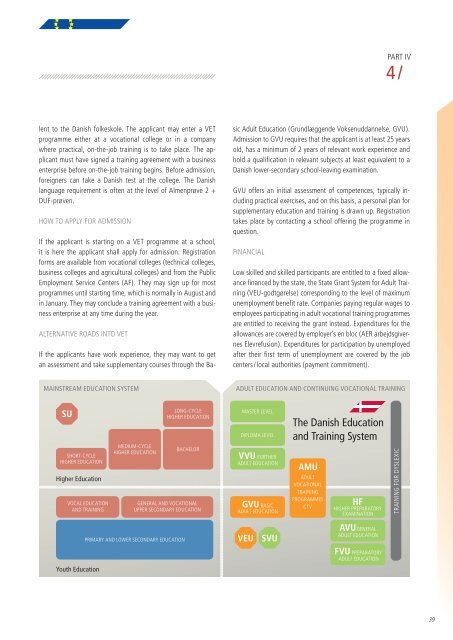RECOGNITION OF NON-FORMAL AND INFORMAL ... - Solidar
RECOGNITION OF NON-FORMAL AND INFORMAL ... - Solidar
RECOGNITION OF NON-FORMAL AND INFORMAL ... - Solidar
Create successful ePaper yourself
Turn your PDF publications into a flip-book with our unique Google optimized e-Paper software.
PART IV<br />
4 /<br />
lent to the Danish folkeskole. The applicant may enter a VET<br />
programme either at a vocational college or in a company<br />
where practical, on-the-job training is to take place. The applicant<br />
must have signed a training agreement with a business<br />
enterprise before on-the-job training begins. Before admission,<br />
foreigners can take a Danish test at the college. The Danish<br />
language requirement is often at the level of Almenprøve 2 +<br />
DUF-prøven.<br />
HOW TO APPLY FOR ADMISSION<br />
If the applicant is starting on a VET programme at a school,<br />
it is here the applicant shall apply for admission. Registration<br />
forms are available from vocational colleges (technical colleges,<br />
business colleges and agricultural colleges) and from the Public<br />
Employment Service Centers (AF). They may sign up for most<br />
programmes until starting time, which is normally in August and<br />
in January. They may conclude a training agreement with a business<br />
enterprise at any time during the year.<br />
ALTERNATIVE ROADS INTO VET<br />
If the applicants have work experience, they may want to get<br />
an assessment and take supplementary courses through the Ba-<br />
sic Adult Education (Grundlæggende Voksenuddannelse, GVU).<br />
Admission to GVU requires that the applicant is at least 25 years<br />
old, has a minimum of 2 years of relevant work experience and<br />
hold a qualifi cation in relevant subjects at least equivalent to a<br />
Danish lower-secondary school-leaving examination.<br />
GVU offers an initial assessment of competences, typically including<br />
practical exercises, and on this basis, a personal plan for<br />
supplementary education and training is drawn up. Registration<br />
takes place by contacting a school offering the programme in<br />
question.<br />
FINANCIAL<br />
Low skilled and skilled participants are entitled to a fi xed allowance<br />
fi nanced by the state, the State Grant System for Adult Training<br />
(VEU-godtgørelse) corresponding to the level of maximum<br />
unemployment benefi t rate. Companies paying regular wages to<br />
employees participating in adult vocational training programmes<br />
are entitled to receiving the grant instead. Expenditures for the<br />
allowances are covered by employer’s en bloc (AER arbejdsgivernes<br />
Elevrefusion). Expenditures for participation by unemployed<br />
after their fi rst term of unemployment are covered by the job<br />
centers / local authorities (payment commitment).<br />
MAINSTREAM EDUCATION SYSTEM<br />
ADULT EDUCATION <strong>AND</strong> CONTINUING VOCATIONAL TRAINING<br />
The Danish Education<br />
and Training System<br />
Higher Education<br />
Youth Education<br />
39
















